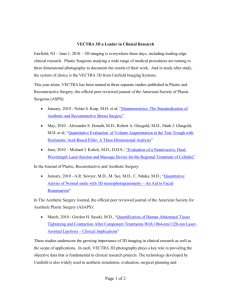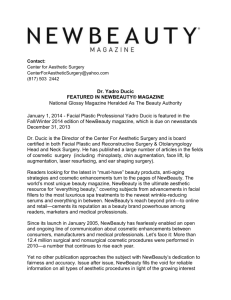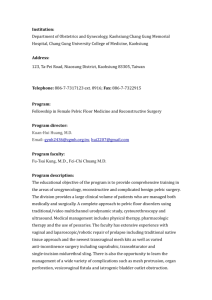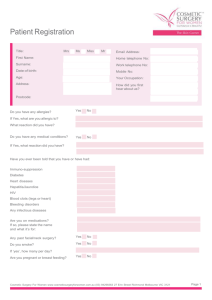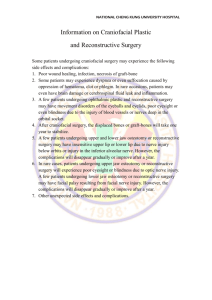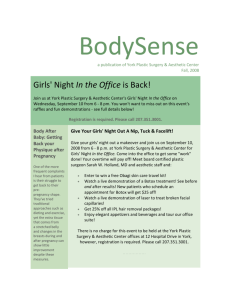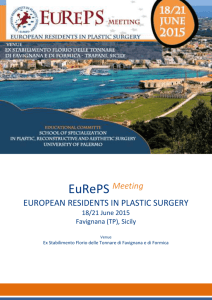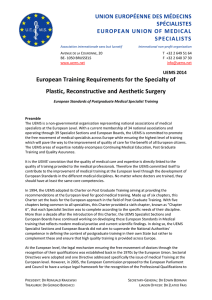Facial Plastic group training programme - UEMS
advertisement
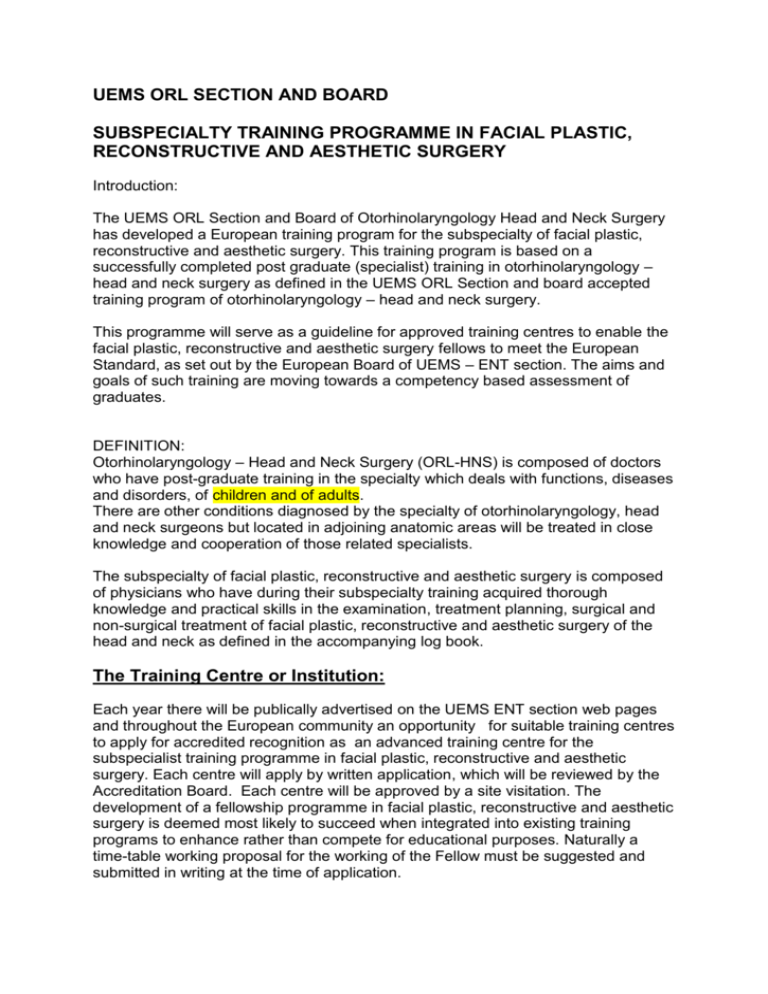
UEMS ORL SECTION AND BOARD SUBSPECIALTY TRAINING PROGRAMME IN FACIAL PLASTIC, RECONSTRUCTIVE AND AESTHETIC SURGERY Introduction: The UEMS ORL Section and Board of Otorhinolaryngology Head and Neck Surgery has developed a European training program for the subspecialty of facial plastic, reconstructive and aesthetic surgery. This training program is based on a successfully completed post graduate (specialist) training in otorhinolaryngology – head and neck surgery as defined in the UEMS ORL Section and board accepted training program of otorhinolaryngology – head and neck surgery. This programme will serve as a guideline for approved training centres to enable the facial plastic, reconstructive and aesthetic surgery fellows to meet the European Standard, as set out by the European Board of UEMS – ENT section. The aims and goals of such training are moving towards a competency based assessment of graduates. DEFINITION: Otorhinolaryngology – Head and Neck Surgery (ORL-HNS) is composed of doctors who have post-graduate training in the specialty which deals with functions, diseases and disorders, of children and of adults. There are other conditions diagnosed by the specialty of otorhinolaryngology, head and neck surgeons but located in adjoining anatomic areas will be treated in close knowledge and cooperation of those related specialists. The subspecialty of facial plastic, reconstructive and aesthetic surgery is composed of physicians who have during their subspecialty training acquired thorough knowledge and practical skills in the examination, treatment planning, surgical and non-surgical treatment of facial plastic, reconstructive and aesthetic surgery of the head and neck as defined in the accompanying log book. The Training Centre or Institution: Each year there will be publically advertised on the UEMS ENT section web pages and throughout the European community an opportunity for suitable training centres to apply for accredited recognition as an advanced training centre for the subspecialist training programme in facial plastic, reconstructive and aesthetic surgery. Each centre will apply by written application, which will be reviewed by the Accreditation Board. Each centre will be approved by a site visitation. The development of a fellowship programme in facial plastic, reconstructive and aesthetic surgery is deemed most likely to succeed when integrated into existing training programs to enhance rather than compete for educational purposes. Naturally a time-table working proposal for the working of the Fellow must be suggested and submitted in writing at the time of application. Approval as a training centre would be renewable every 5 years, as per performance against specific criteria. Requirements of the Training Centre; 1. Evidence of centralisation of patient care. 2. Evidence of a sustained clinical volume and activity in facial plastic, reconstructive and aesthetic surgery over a preceding period of 5 years – (e.g., >200 new cases). 3. Evidence that modern contemporary management of facial plastic, reconstructive and aesthetic surgery. 4. There should be adequate numbers of clinicians directly related or affiliated to facial plastic, reconstructive and aesthetic surgery 5. Facilities and time available for didactic learning opportunities. 6. Facilities and time allocation for basic scientific research. 7. Facilities for study and availability of library – journals, textbooks, videos , internet etc The Trainee or Fellow: Admission to the Subspecialty Training Programme in facial plastic, reconstructive and aesthetic surgery is contingent upon completion of in General Otorhinolaryngology, head and neck surgery in general and must have been registered as a ORL Specialist for a minimum of 5 years. 1. Applications will be made in writing and supported by citations on suitability from three clinical referees, at least two out of which shall be from current mentors/trainers. 2. Previous clinical and surgical work in the subspecialty will be taken into consideration in the selection process. 3. Candidates on selection will be requested to attend for interview, and appointment to the training programme will be competitive – there may be more institutions or more candidates year on year. 4. The clinical training will be for a period of 2 years full time or equivalent training and will not be extended for any additional period of time. 5. The fellow must partake in all facets of clinical activity, and must not be considered as a resident in general ORL-HNS. 6. Ample time needs to be filled in to the weekly working program for compulsory study: nominal journals, text books, course, congresses etc 7. The fellow is expected annually to return to the Board an evaluation form on the programme content and structure, supervision and expertise of the trainers, as well as the programme director. The Programme Director: 1. The programme director must be an acknowledged expert certainly National, but preferably European if not International expert by repute and have a solid academic background (e.g. docent or equivalent production). 2. Each programme director must be supported by his national ORL Society. 3. The hospital administrator or Chief Executive, as well as the Dean of the Medical School, and The Professor of ORL/HNS must support the development of a Fellowship programme in facial plastic, reconstructive and aesthetic surgery. 4. The programme director must contribute sufficient time to the programme to assure adequate leadership – considered to be more than 10 years of professional experience. 5. The programme director must be “experienced” in facial plastic, reconstructive and aesthetic surgery and must possess appropriate qualification to ensure proper instruction and supervision of trainees or fellows. 6. The programme director must demonstrate an interest in teaching, as well as demonstrating a track record in education and mentorship, as well as participation in regional and national scientific societies, presentations and publication of scientific and clinical studies and/or active participation in research as it pertains to facial plastic, reconstructive and aesthetic surgery. 7. At least two “full-time” surgical faculty members should be committed to the training programme. 8. The use of fellows exclusively for expansion of clinical practice potential or medical student/residency training is strictly prohibited. 9. Sufficient clinical material must be available to assure exposure to the broad range of conditions and problems associated with the management of facial plastic, reconstructive and aesthetic surgery. The Programme: Academic: 1. Programs must develop a structural curriculum with defined goals and objectives. 2. Clinical, basic science and research conferences as well as seminars and critical literature review activity pertaining to the subspecialty, must be conducted regularly and as scheduled. 3. It is essential that the fellow participates in the planning and conducting conferences. Both the faculty and trainees must attend and participate in multidisciplinary conferences. 4. Fellows must have the appropriate supervised opportunities to develop skills in providing consultation and communication with colleagues and referring clinicians. 5. Fellows training must involve increasing responsibility in both inpatients and outpatients environments and should culminate in significant patient management responsibilities spent within the institution. Clinical: 1. Programmes must provide structured clinical opportunities for fellows to develop advanced skills in head and neck surgery. 2. On completion of training the fellow must have had a cumulative experience so as to be senior operating or teaching surgeon – mainly major cases. (Minor cases include endoscopy and tracheostomy.) 3. A sufficient number and variety of cases must be available for each trainee to assure adequate inpatient and outpatient exposure to the broad range of conditions associated with facial plastic, reconstructive and aesthetic surgery. 4. Clear lines of responsibility and appropriateness between fellows and trainees must be defined at the commencement of each areas of training, clinical duties and duration of training. 5. The working relationship between the fellow and the resident trainees must be complimentary and enhance the educational experience. Evaluation: 1. Programme director must establish procedures for evaluating the clinical and technical competence of the fellow. The trainee will document his/her progress by keeping the UEMS log book of facial plastic, reconstructive and aesthetic surgery subspecialty training. 2. Faculty Evaluation – the training faculty must evaluate the fellow on a semi-annual basis and must include teaching ability and commitment, clinical knowledge and scholarly contributions 3. Programme Evaluation – There should be documented evidence of periodic self-evaluation of the program in relation to the educational goals, the needs of the trainees and the teaching responsibilities of the faculty. 4. At the end of the training the trainee needs to pass an exam to demonstrate his/her knowledge of the required literature and clinical knowledge. Depending on the legislation the exam can be National or European. On completion of the training and successful demonstration of competency and successful passing of the European examination the candidate will be able to use the suffix graduate of European training in otorhinolaryngology – head and neck surgery (ETORL-HNS). The progression of the trainee must be recorded on an annual basis (years 1 - 2) with the number of procedures performed in three categories: (a) (s) (i) Trainee assists the trainer Trainee requires supervision/assistance by the trainer whilst he/she performs the procedure/management Trainee performs the procedure/management independently/alone with the trainer available. For example: Rhinoplasty 1st year a s i 4 2 - 2nd year a s i 4 3 Date and signature when competency is achieved The relevant trainer should endorse by signing and dating in column 3, when the trainee has achieved competency with each particular management or procedure.
